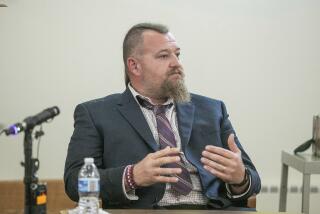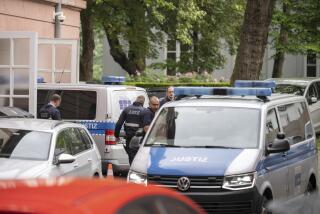4 Accused of Plotting U.S. Embassy Attack Are Acquitted
PARIS — A Dutch court on Wednesday acquitted four men charged with plotting to bomb the U.S. Embassy in Paris and other American targets, handing law enforcement a big setback in the first European trial of suspected terrorists arrested after the Sept. 11 attacks.
In its ruling, a three-judge panel in Rotterdam threw out most of the evidence because it was gathered by Dutch intelligence agents who conducted searches without warrants.
Even if the evidence had been admitted, said Judge S. Van Dooren, a court spokesman, it did not prove that the defendants were a support cell for a North African network in the Netherlands, Belgium and France. The network allegedly planned to attack the Paris embassy and a U.S. military base in Belgium.
The verdict proved that Dutch authorities rushed into a weak prosecution in the tense days after Sept. 11, said Inge Saey, a lawyer for Jerome Courtailler, a French convert to Islam accused of leading the purported cell.
“There was no evidence that my client was preparing an attack or belonged to a criminal organization,” Saey said in a telephone interview. “My client was never in Afghanistan. My client doesn’t speak Arabic. He is not an extremist or a fanatic.”
Prosecutors said they would appeal. The outcome troubled European and U.S. officials, who said considerable evidence connects the Rotterdam group to accused Al Qaeda figures facing trial elsewhere.
Courtailler, 28, was an admitted associate of Nizar Trabelsi, a Tunisian imprisoned in Belgium who has said he intended to commit a suicide bombing against a U.S. military base in Klein Brogel, Belgium. Police said they found bomb-making formulas and an Uzi machine pistol at Trabelsi’s apartment in Brussels and bomb-making chemicals in the basement of a restaurant owned by a friend.
The trial demonstrated the difficulties of prosecuting terrorism cases in Europe’s patchwork of diverse judicial systems. Unlike Spain, the Netherlands does not have tough laws for prosecuting alleged terrorists if they are not linked to a specific act. Unlike France’s domestic intelligence agency, the Dutch Internal Security Service does not have the ability to simultaneously conduct counterespionage and investigate criminal cases.
In addition, Islamic extremists have refined the craft of compartmentalizing activities and spreading out cells to use Europe’s borders as shields. That aggravates a perennial dilemma in terrorism cases: whether to make arrests or wait and watch. Months of surveillance had convinced French, Belgian and Dutch investigators that Trabelsi and his group were dangerous, so they were rounded up Sept. 13, 2001, during a Europe-wide blitz of suspected Islamic extremists.
“This was a classic example of the issue of prevention versus prosecution,” said a U.S. official familiar with the case. “On Sept. 13, no one knew what else was about to hit. There was fear of a second wave of attacks in Europe.” Courtailler and his brother, David, were well known to police across Europe, who had shadowed them for years. The Courtaillers’ path to Islam began in an Alpine village in southeastern France, where the brothers grew up playing soccer and working in the family butcher shop.
The Courtaillers went to Britain, where they embraced Islam and frequented radical mosques that are hubs for the Al Qaeda network in Europe. They met figures such as Jamal Beghal, an Algerian awaiting trial in France as the accused boss of the North African network.
After Beghal was arrested in the United Arab Emirates in July 2001, authorities say, he confessed to plotting to bomb the Paris embassy on the orders of top Al Qaeda leaders in Afghanistan. Beghal later said he made the admissions under duress.
Jerome Courtailler also spent time in Spain in July 2001 with North Africans who are now facing terrorism charges there, according to Spanish court documents. French authorities say Jerome and his brother, who has admitted that he trained at an Al Qaeda camp in Afghanistan, associated in London with Frenchman Zacarias Moussaoui, the accused “20th hijacker” charged in the Sept. 11 attacks.
Saey said Wednesday that there was no evidence at trial indicating that her client knew Moussaoui. The judges ordered Courtailler’s release along with that of defendants Abdelghani Rabia and Amine Mezbar, both Algerians, and Saaid Ibrahim, a Dutch citizen of Ethiopian descent. Courtailler and the Algerians were being held on immigration charges Wednesday, the lawyer said.
Meanwhile, Britain has arrested seven suspects under its Terrorism Act. No details were given, but the arrests came as senior British officials warned of a “high probability” of a terrorist attack.
More to Read
Sign up for Essential California
The most important California stories and recommendations in your inbox every morning.
You may occasionally receive promotional content from the Los Angeles Times.










